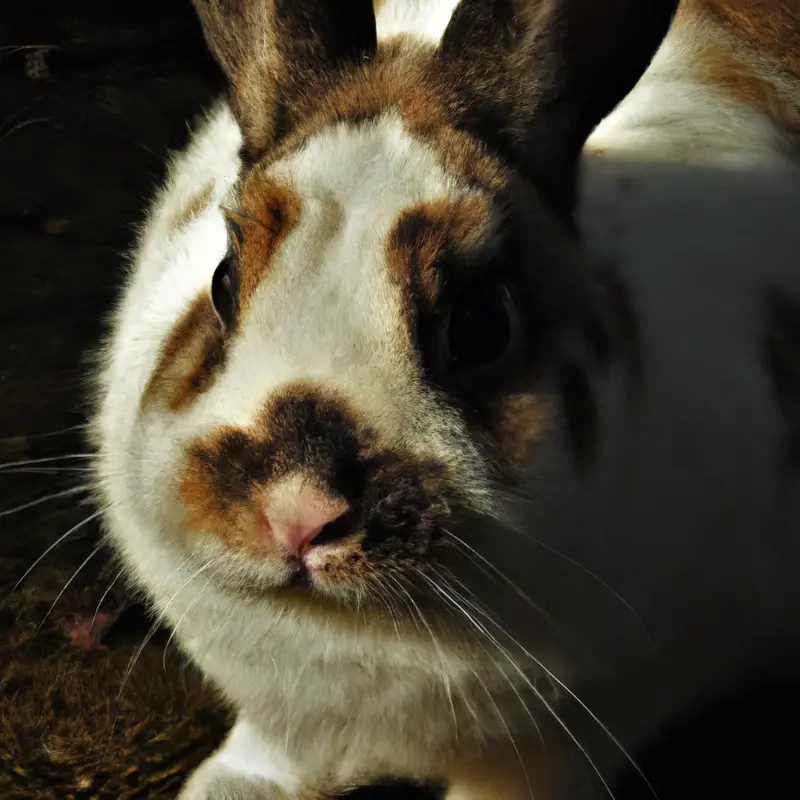How Much Do Rabbits Weigh? A Fluffy Mystery!
Key Takeaways:
- Adult rabbits typically weigh between 2 to 11 pounds.
- Dwarf rabbit breeds usually weigh less than 5 pounds.
- Rabbits’ weight can vary depending on their breed, diet, and age.
- Regular monitoring of a rabbit’s weight is important for their overall health.
Have you ever wondered how much rabbits weigh?
These adorable furry creatures come in all shapes and sizes, and understanding their weight is crucial for their overall health and well-being.
In this blog article, we will delve into the importance of knowing rabbit weight, explore the factors that affect it, and discover the average weight ranges for different rabbit breeds.
We will also learn how to weigh rabbits safely and provide tips for maintaining a healthy weight.
So, whether you’re a proud rabbit owner or simply curious about these delightful pets, let’s embark on this weighty journey together!
| Rabbit Breed | Average Weight (lbs) |
|---|---|
| Mini Rex | 3 – 4.5 |
| Dutch | 4 – 5.5 |
| Holland Lop | 2 – 4 |
| Flemish Giant | 13 – 14 |
| Lionhead | 2.5 – 3.75 |
| English Lop | 6 – 10 |
| Angora | 7 – 12 |
| Polish | 2 – 3 |
Understanding Rabbit Weight
Understanding Rabbit Weight is important for several reasons, including determining their overall health and tracking any fluctuations over time.
Why is Knowing Rabbit Weight Important?
Knowing a rabbit’s weight is important for several reasons.
Firstly, it helps you monitor their overall health.
By regularly weighing your rabbit, you can quickly notice any significant weight loss or gain, which may indicate an underlying health issue.
Secondly, proper weight management is crucial for preventing obesity and its associated health problems.
Maintaining a healthy weight can ensure your rabbit leads a happy and active life.
Lastly, knowing your rabbit’s weight is important for providing accurate medication doses, as many medications are administered based on the rabbit’s weight.
So, make it a habit to weigh your furry friend to keep them healthy and thriving.

Factors Affecting Rabbit Weight
There are several factors that can affect a rabbit’s weight. One important factor is their diet.
Rabbits need a balanced diet of hay, fresh vegetables, and a small amount of pellets.
Food quantity and quality can impact their weight. Another factor is exercise.
Rabbits should have enough space to move around and play.
Lack of exercise can lead to weight gain. Genetics also play a role.
Some rabbit breeds naturally have larger or smaller frames, which can affect their weight.
Illness or medical conditions can also impact a rabbit’s weight. If you notice a sudden change in your rabbit’s weight, it’s best to consult a veterinarian to rule out any health issues.

Average Weight of Different Rabbit Breeds
Different rabbit breeds have varying average weights.
Here’s a rundown of some popular breeds:
- Netherland Dwarf: This breed typically weighs between 1.1 to 2.5 pounds.
- Lionhead: Lionheads weigh around 2.5 to 3.75 pounds.
- Dutch: Dutch rabbits weigh approximately 3 to 5.5 pounds.
- Mini Lop: On average, Mini Lops weigh between 4.5 to 6 pounds.
- Flemish Giant: The largest breed, Flemish Giants can weigh anywhere from 13 to 20 pounds.
Remember that these weights are averages, and individual rabbits may fall outside of the typical range.
Keep in mind that factors such as diet, exercise, and genetics can also influence a rabbit’s weight.
It’s always best to consult with a veterinarian for specific guidance regarding your rabbit’s health and weight.
How to Weigh Your Rabbit
To weigh your rabbit, use a small scale and gently place your bunny on it.
Methods for Weighing a Rabbit
To weigh a rabbit, you have a few simple methods at your disposal:
- Use a pet scale: Place your rabbit on a pet scale and record its weight. Make sure the scale is suitable for small animals and has a stable surface.
- Use a kitchen scale: If you have a small kitchen scale, you can weigh your rabbit by placing a container on the scale and then adding the rabbit to it. Subtract the weight of the container to determine your rabbit’s weight.
- Use a hanging scale: If you have a hanging scale, you can place a towel or a small pet carrier on it and suspend it securely. Gently place your rabbit in the carrier or wrap it in the towel and record the weight.
Remember to be gentle and cautious while weighing your rabbit to ensure its safety and comfort.

Tips for Weighing a Rabbit Safely
To weigh a rabbit safely, start by using a pet scale or a kitchen scale set to grams.
Place a towel or blanket on the scale to provide a comfortable surface for your rabbit to sit on.
Gently pick up your rabbit and place them on the scale, making sure to support their body.
Record the weight and offer them a treat as a reward.
Repeat this process regularly to monitor your rabbit’s health.
Remember, always prioritize your rabbit’s safety and well-being during the weighing process.
Frequency of Weighing a Rabbit
How often should you weigh your rabbit?
It’s a good idea to weigh your rabbit regularly, especially if they are young, elderly, or have health issues.
For most rabbits, weighing them once a month is sufficient.
However, if your rabbit has recently changed their eating habits, seems to be losing or gaining weight, or if you have concerns about their health, you may want to weigh them more frequently.
Remember to use a pet scale or a kitchen scale that measures in grams for accuracy.
Maintaining a Healthy Weight for Your Rabbit
To ensure your rabbit stays healthy, it’s important to maintain its weight within the ideal range.
Ideal Weight Ranges for Rabbits
Rabbits come in different shapes and sizes, so it’s important to know their ideal weight ranges.
For small breeds, a healthy weight is usually between 2 to 4 pounds.
Medium-sized breeds should ideally weigh between 4 to 8 pounds, while larger breeds can range from 8 to 12 pounds.
Keep in mind that these are general guidelines and individual rabbits may vary.
Regularly monitoring your rabbit’s weight and consulting with a veterinarian can help ensure they stay within a healthy range.
How to Monitor and Manage Rabbit Weight
To monitor and manage your rabbit’s weight, it’s important to keep a close eye on their food intake and exercise routine. Regularly weigh your rabbit to track any fluctuations and make adjustments to their diet accordingly.
Provide a balanced diet of hay, fresh vegetables, and a limited amount of pellets.
Avoid overfeeding treats and high-calorie foods. Encourage exercise by providing them with plenty of space to move around and engage in regular playtime.
Consulting with a veterinarian can also help ensure your rabbit maintains a healthy weight.
Common Reasons for Rabbit Weight Gain or Loss
Rabbits can experience weight gain or loss due to a variety of reasons.
One common reason for weight gain is overfeeding, which can lead to obesity.
Other factors, such as lack of exercise, can also contribute to weight gain.
On the other hand, weight loss in rabbits can be caused by dental issues, digestive problems, or underlying health conditions.
Make sure to provide a balanced diet and plenty of exercise for your rabbit, and consult a veterinarian if you notice any significant changes in their weight.
Frequently Asked Questions (FAQs) about Rabbit Weight
How often should I weigh my rabbit?
“How often should I weigh my rabbit?” It’s important to weigh your rabbit regularly to monitor their health and ensure they are maintaining a healthy weight. This can be done once a month or as recommended by your veterinarian.
Regular weighing can help you identify any sudden weight loss or gain, which could be a sign of health issues.
It’s best to use a digital scale designed for small animals and record their weight in a log to track any changes over time.
What should I do if my rabbit is overweight?
If your rabbit is overweight, there are a few things you can do to help them get back to a healthy weight. First, consult a veterinarian to rule out any underlying health issues.
Then, adjust their diet by offering more hay and reducing the amount of pellets and treats.
Increase their exercise by providing more playtime and opportunities to hop around. Monitor their weight regularly and make adjustments as needed.
Remember, slow and steady weight loss is safest for rabbits.
What should I do if my rabbit is underweight?
If your rabbit is underweight, there are a few things you can do to help them.
Firstly, make sure they have access to fresh, high-quality food at all times.
Consider feeding them a diet that is higher in fiber, such as hay and leafy greens.
Secondly, provide them with plenty of exercise and mental stimulation to keep them active and engaged.
Thirdly, consult with a veterinarian to rule out any underlying medical conditions that may be contributing to their weight loss.
Remember, a balanced diet and proper care are essential in maintaining a healthy weight for your rabbit.
Can rabbits lose weight due to illness?
Yes, rabbits can definitely lose weight if they are ill.
Illness can affect a rabbit’s appetite, digestion, and overall health, leading to weight loss.
If you notice that your rabbit is losing weight without any apparent reason like a change in diet or exercise, it’s important to take them to a veterinarian for a proper diagnosis and treatment.
Rabbits are fragile creatures, and any sudden weight loss should not be ignored.
Taking prompt action can help ensure their well-being.
Final Verdict
Understanding and monitoring your rabbit’s weight is crucial for their overall health and well-being.
By knowing your rabbit’s weight, you can identify any potential health issues and make necessary adjustments to their diet and lifestyle.
Maintaining a healthy weight range for your rabbit is essential, and regular weighing can help you achieve this.
Remember to weigh your rabbit safely and consult a veterinarian if you notice any significant weight gain or loss.
By staying proactive and vigilant, you can ensure your rabbit lives a long and healthy life.







